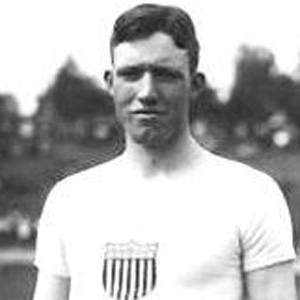Alma Richards Was Utah’s First Olympic Gold Medalist
W. Paul Reese
History Blazer, February 1995
 Alma Richards, a lanky, unassuming Parowan, Utah, farm boy seemed an unlikely competitor in the 1912 Olympics in Stockholm, Sweden. Fellow athletes, while aboard a ship sailing to the games, amused themselves by prodding the “raw youngster” on his hick upbringing. Richards made it to the games on a supplementary list and only then at the insistence of a U.S. Olympic commissioner who had watched the Utahn perform and became “convinced that he was one of the greatest jumpers in the world.” A few days into the games the commissioner’s instincts proved true; Richards won the gold medal in the running high jump and set a new Olympic record.
Alma Richards, a lanky, unassuming Parowan, Utah, farm boy seemed an unlikely competitor in the 1912 Olympics in Stockholm, Sweden. Fellow athletes, while aboard a ship sailing to the games, amused themselves by prodding the “raw youngster” on his hick upbringing. Richards made it to the games on a supplementary list and only then at the insistence of a U.S. Olympic commissioner who had watched the Utahn perform and became “convinced that he was one of the greatest jumpers in the world.” A few days into the games the commissioner’s instincts proved true; Richards won the gold medal in the running high jump and set a new Olympic record.
Richards was born February 20, 1890, in Parowan, Iron County, to Morgan and Margaret Richards and began his track and field career while attending the Murdock Academy at Beaver. He later claimed that his running and jumping prowess came from chasing jackrabbits in the fields near his home. After a successful high school athletic career Richards attended Brigham Young University where he perfected his technique under the coaching genius of Eugene L. Roberts.
Richards’s unorthodox style startled the jumping world. He leapt with his body erect and his legs crossed under him but still managed to reach great heights. Regardless, he was not considered a serious contender at the Stockholm games. All the world’s greatest jumpers had gathered in Sweden, including George L. Horine, the world record holder from Stanford University. Yet, as the athletes began their jumps, many of the top contenders failed to clear the bar and soon even Horine missed. Only Richards and Hans Liesche, the German competitor were left. The bar was at 6′ 3″. Both jumpers cleared this height and it was raised again. When the bar reached 6′ 3.3″ Richards again flew over, but the German did not.
The farm boy from Parowan won the gold, becoming Utah’s first Olympic champion in any sport. Richards later recalled his feelings at the medal ceremony: “Nothing ever will erase that memory, when King Gustav stepped forward to place the gold medal around my neck while the Stars and Stripes rose to the top of the highest flag pole and the band played the Star Spangled Banner.”
Throughout his entire athletic career Richards won more than 245 medals and trophies in track and field events worldwide. As a soldier in World War I he competed at the 1919 American Expeditionary Force Games in Paris and was the high point athlete of the meet. Such a showing prompted the U.S. commanding officer, General Pershing, to comment, “Lieutenant Richards, you are the greatest athlete in the armed forces.”
Richards also excelled academically, and after attending the University of Southern California was admitted to the California Bar. Instead of practicing law, however, he taught high school in California for thirty-one years. He died April 3, 1963, and has since been inducted into the Utah Sports Hall of Fame, Helms Hall of Fame, Brigham Young University Hall of Fame, and the U.S. Track and Field Hall of Fame.